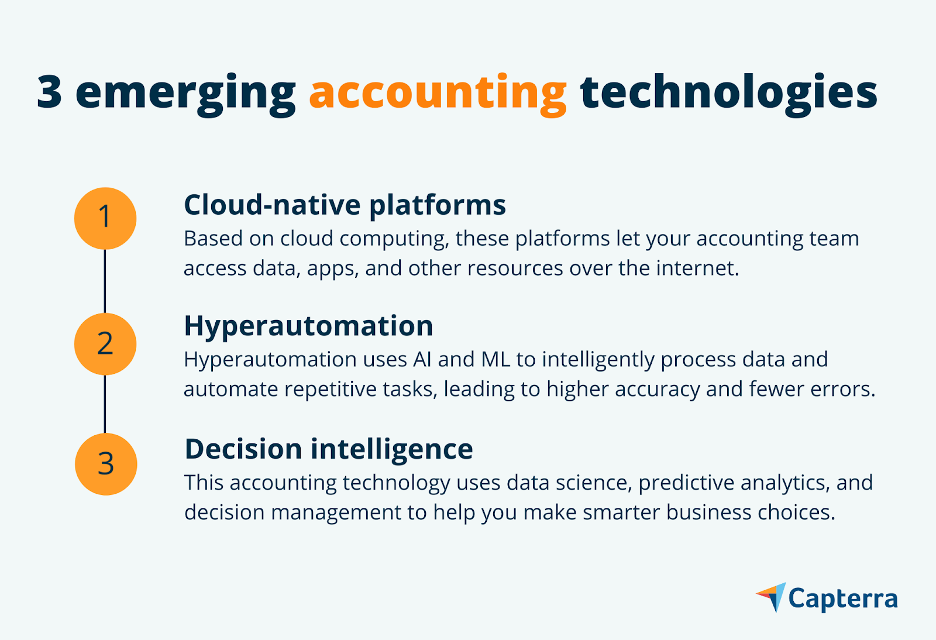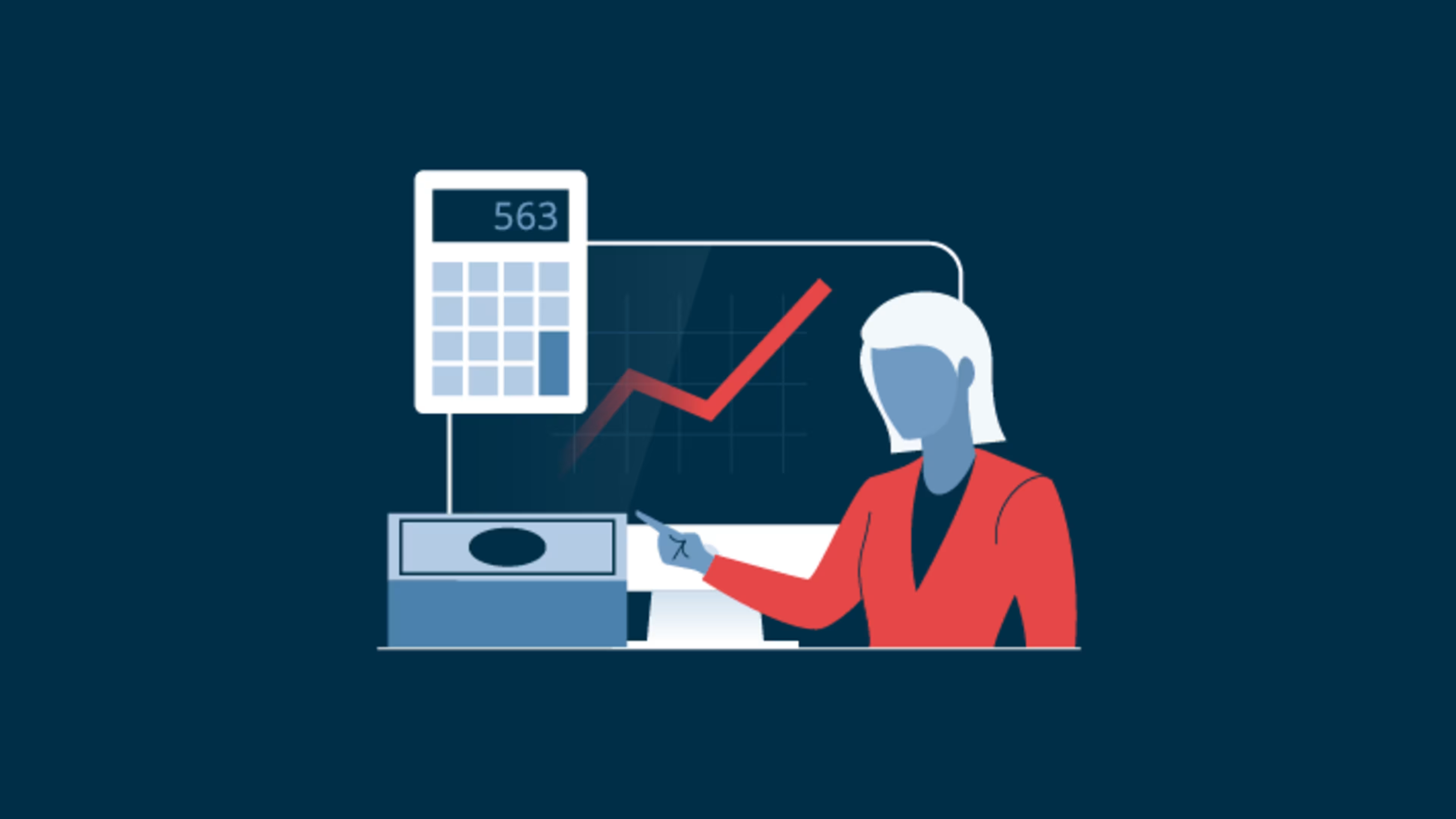Emerging technologies to help your small business gain a whole new level of accounting efficiency.
Are you a small-business leader looking to upgrade your accounting technology or improve your business’s financial decision-making? Do you want to know if it makes sense for your small business to adopt evolving technology such as artificial intelligence or machine learning? The answer is simple: Yes, it does.
Emerging accounting technologies can not only streamline and automate daily operations to save time for your team but also provide deeper data-driven insights to improve their overall decision-making capabilities.
In this article, we discuss three emerging accounting technologies, based on Gartner's 2022 Strategic Technology Trends Report for Finance[1], that your small business can benefit from. We also share tips to help your business prepare to implement these technologies into your existing processes.

1. Use cloud-native platforms
If you have a remote or hybrid team, you must have seen your accounting professionals struggling to access documents, facing difficulty in collaboration, losing their heads over lost data, or blaming their systems for not meeting deadlines.
Using a cloud-native accounting platform can solve all of these challenges. Cloud-native platforms use the power of cloud computing to let your accounting team access data, software apps, services, and other resources via the internet, at any time and from anywhere.
According to Gartner, by 2025, 95% of all new digital initiatives will be based on cloud-native platforms compared to less than 40% in 2021[1].
How this trend benefits your small business
If your small business pivots from traditional accounting to cloud-based accounting, perks such as increased productivity will be much more in your favor.
Your accountants will have real-time access to the data they need. Also, your accounting data will be saved in the cloud (online storage), making stakeholder and team collaboration easier. That means everyone will be able to view and edit documents together in real-time.
With cloud-native platforms, you also reduce the risk of data loss. Cloud service providers use advanced security measures such as firewalls and two-factor authentication to restrict unauthorized data access. Also, most providers offer a service uptime guarantee, which ensures zero server downtime for your cloud accounting platform.
What your small business can do to prepare
Make a plan, in line with your company's objectives and business strategy, to onboard an accounting software platform that uses native cloud delivery. If you’re not ready to invest in one, here are some free accounting software options to get you started.
Devise an action plan to leverage all the capabilities of your new accounting software.
To maximize efficiency, integrate the software with the existing applications your accounting team uses.
2. Leverage hyperautomation for quality work
As your business grows, your data stack becomes heavier. This could make it a task for your accountants to manually manage processes and keep financial records up to date. They’ll be spending hours completing tedious tasks such as entering data into ledgers, and that alone can increase the chances of human error.
Hyperautomation can help prevent such a situation. This accounting technology uses artificial intelligence and machine learning to imitate the way your accountants work. It can intelligently understand and process financial data, leading to higher accuracy and lower error margins. It can also automate repetitive accounting operations such as payroll administration, invoice processing, and preparation of financial statements.
Gartner predicts that by 2024, many businesses will be using hyperautomation to redesign their accounting processes, saving up to 30% of their operational costs[1].
How this trend benefits your small business
Hyperautomation can help automate the majority of your accounting operations, saving your accounting team both time and effort. Your accountants can use this bandwidth on tasks that require strategic and analytical thinking—human aspects that technology or machines cannot mimic.
Some examples of these accounting tasks are improving financial models, analyzing market trends, conducting internal audits, and performing data analysis. Hyperautomation allows you to use your accounting department in every possible way to elevate your small business's financial performance and not just manage it.
What your small business can do to prepare
Create a plan underlining everything you want to automate in your accounting department. Don’t forget to include the end results you’re looking to achieve.
Determine which automation opportunities best suit your accounting division and which technology tools are the best fit for each opportunity.
Use accounting automation software such as accounts payable, financial close, and forms automation to embrace this emerging technology and save your accounting team hours of hard work.
Jake Grimm[2], director of technology at Summit CPA Group, shares his experience about how hyperautomation helped boost the productivity of his accounting and finance company.
“From a financial perspective, by incorporating automation into our accounting firm strategy, we have saved an estimated 2-3 hours per month per client. That turns out to be 20-30 hours per month for an accountant with an average of 10 clients. This has greatly increased our team’s capacity.”


Jake Grimm
Director of technology at Summit CPA Group
3. Adopt decision intelligence for smarter choices
Do you know what financial impact a single process change can have on your business? Can you identify new business opportunities and potential risks? Can you tell if your business is sitting on the verge of a crisis?
These are questions you cannot answer on your own, but decision intelligence can, on your behalf.
Decision intelligence is technology that uses artificial and business intelligence to help you make smarter decisions. It uses a combination of data science, predictive analytics, and decision management to make intelligent, high-performant choices for your business.
Gartner forecasts that by 2023, over 33% of companies will have analysts who will specialize in decision intelligence, including financial modeling[1].
How this trend benefits your small business
Decision intelligence will allow your accounting professionals to make better automated decisions, supported by the power of artificial intelligence and machine learning.
Your accounting team can develop hypotheses about how certain financial decisions will play out. You can not only test those hypotheses through simulations but also refine your decision-making models and communicate the findings to stakeholders.
Your small business can also use decision intelligence to make better operational decisions around customer interactions, smarter managerial decisions such as recruitment, and strategic decisions such as business partnerships.
What your small business can do to prepare
Use a decision intelligence framework on a few accounting processes first, and based on the results you receive, implement it more broadly to cover multiple processes.
Prioritize the automation of accounting decisions where data can be used to select from a predefined set of possible alternatives.
Make decisions and develop practices utilizing both human talent and technology. Also, set up a feedback process to improve the results.
Use software solutions such as business intelligence, predictive analytics, and decision support to embrace this emerging accounting technology.
Be future-ready with these emerging accounting technologies
The accounting industry is always evolving, with new technologies being developed frequently. The accounting technology trends we discussed in this article are some of the most prevalent in the market right now. Invest in them and leverage their capabilities to make your small business more efficient.
Check out these Capterra resources to learn more about the future of small-business accounting:

